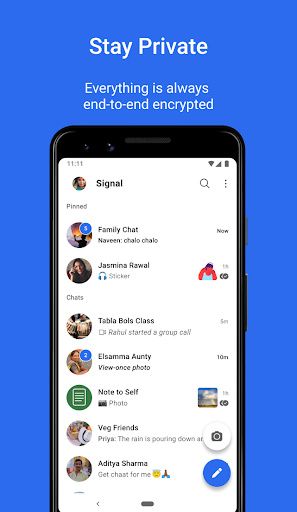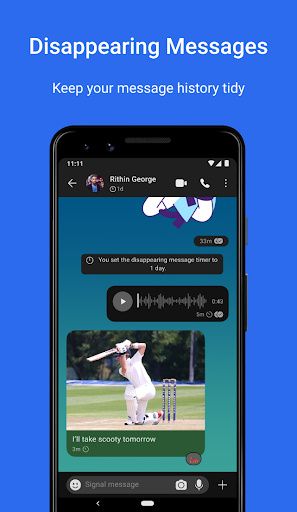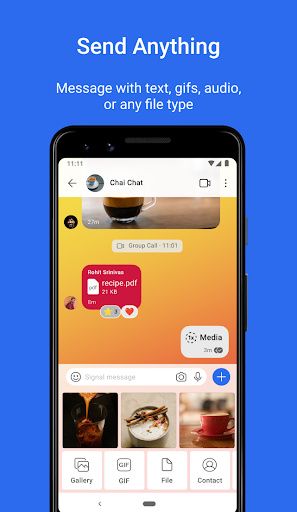At a time when mass surveillance by corporations and governments is increasingly becoming commonplace, consumers are looking for messaging apps that can keep their private conversations away from prying eyes. While there are plenty of messaging apps available to consumers, not all have the same level of protection or consumer interest at heart. This is where Signal comes into play.
What is Signal?
Signal is a cross-platform messaging app with a deep focus on privacy and security. It’s free-to-use and is run by the non-profit Signal Technology Foundation. Moreover, it’s end-to-end encrypted, so all your chats and calls are inaccessible to everyone barring you and the intended recipient.
Thanks to its privacy protections, Signal has gained prominence in recent years, especially after the Black Lives Matter protests in the US and the WhatsApp privacy policy snafu. It has also been championed by the likes of Elon Musk. According to some estimates, the app had 40 million monthly active users as of January 2021.
How to download and install Signal

Signal is available for Android, iPhone/ iPad, Windows, Mac, and Linux users. It’s pretty straightforward to install — Android users can download the messaging app from Google Play, whereas it’s available for iPhone and iPad users via the Apple App Store. Google Play and the App Store will automatically take care of the installation process. Notably, Signal can only be used on phones running Android 4.4 or newer, iPhones running iOS 11.1 or newer, and iPads running iOS 11.1/ iPadOS 13 or newer.
Signal Private Messenger (Free, Google Play) →
For other platforms like Windows, Mac, and Linux, you’ll have to download Signal by going to its website. If you’re using Windows, run the downloaded executable (.exe) file and follow the onscreen instructions. macOS users will have to do the same with the downloaded disk image file (.dmg). Signal supports the 64-bit version of Windows 7 or newer, and macOS 10.11 or newer.
The process is slightly different for Linux users and the app can only be installed on 64-bit Debian-based Linux distributions like Ubuntu, Linux Mint, and Kali Linux. To install Signal on Linux, run the following three commands in Terminal.
wget -O- https://updates.signal.org/desktop/apt/keys.asc | gpg --dearmor > signal-desktop-keyring.gpg
cat signal-desktop-keyring.gpg | sudo tee -a /usr/share/keyrings/signal-desktop-keyring.gpg > /dev/null
echo 'deb [arch=amd64 signed-by=/usr/share/keyrings/signal-desktop-keyring.gpg] https://updates.signal.org/desktop/apt xenial main' |\
sudo tee -a /etc/apt/sources.list.d/signal-xenial.list
sudo apt update && sudo apt install signal-desktopHow to set up Signal on an Android phone or iPhone

- Once you’ve installed Signal on Android or iPhone, open the app. You’ll be asked to give Signal permission to access contacts and phone calls. Signal for iPhone also asks for permission to send notifications.
- After you’ve given the necessary permissions, Signal will ask for your mobile number. This mobile number is necessary to sign up for the service.
- Signal will then send a six-digit code to your mobile number. You have to enter this code to progress further.
- After the code, the app will ask you to set up your Signal profile by adding your name and uploading a profile picture. You can choose to skip the profile photo and last name but a first name is required.
- Then Signal will ask you to create a PIN. This PIN is used to encrypt your profile information and conversations. You won’t be asked for this PIN to log into the app but it’ll be required to restore your account if you re-install the app. The PIN can be numeric or alphanumeric but at least 4-digits long. You will then have to reenter the PIN to confirm.
- After completing the PIN generation, you’re ready to use the app.
How to set up Signal on iPad
There are two ways in which you can set up Signal on iPad. You can either choose to link the iPad app to your existing Signal account or you can set the iPad up as a separate device.

- To link Signal’s iPad version to your existing account, open the app on your iPad and select Continue.
- You’ll then be asked to give the necessary permissions. Tap Allow for these permissions.
- After the permissions, it’ll ask you whether you want to transfer your existing account from another iPad or add the iPad as a new device. Since this is your first time installing the app on an iPad, choose Add as New Device. You’ll then be asked to open the app on your phone. Make sure your Signal setup is complete on your phone before attempting to link it on iPad.
- Open the app on your phone and navigate to Linked devices under its settings.
- Tap the plus (+) icon on Android or Link New Device on iOS. You may be asked to give the camera permissions to the app.
- Tap Next on the iPad app and scan the QR code using your phone.
- Pick a name for the linked iPad and select Finish. You can now use the app on your iPad.
If you plan to set up the iPad as a separate device for Signal, open the app and tap on the unlink icon in the top right. Now you can just follow the instructions given in the “How to set up Signal on an Android phone or iPhone” section to complete the setup.
How to set up Signal on desktop

Signal for desktop can only be used as a linked version. So make sure you’ve set up the app on your Android or iPhone and then attempt to set it up on your desktop. After that, setting up Signal on desktop – Windows, macOS, and Linux – is pretty easy.
Just open it and you’ll be asked to scan a QR code using the app on your phone. Open Signal on your phone and navigate to Linked devices under its settings. Then tap the plus (+) icon on Android or Link New Device on iOS. You can now scan the QR code and give a name to the linked device. That’s it, you’re done. You can now start using Signal on your Windows, Mac, or Linux machine.
Is there multi-device support on Signal, and what about Android tablets?
Signal offers multi-device support but it’s restricted. You can install Signal on an Android phone, iPhone or iPad. After that, you can link it to desktop devices. So this way, you are getting Signal on multiple devices, but you can’t use the same Signal account on multiple mobile devices. Also, Signal doesn’t officially support Android tablets.
How to use Signal
Now that you have Signal up and running on any of the platforms, it works similarly to other chat apps like WhatsApp or Telegram. To send a new individual message, tap the pencil icon. Depending on your platform, the pencil icon may be present on the bottom right or top right. Tapping on the pencil icon will pull up all your contacts who are already present on Signal. You can also use the pencil icon to start a new group conversation or invite a contact to Signal. Just tap on a contact in the list and a chat window will open. You can then start exchanging messages.





On top of the chat window, you’ll also see video and voice call icons that can be used to initiate a video or voice call, respectively. Moreover, you can tap on a contact’s name in the chatbox to get the settings specific to that contact. Here, you’ll have the option to switch on Disappearing Messages, change the chat wallpaper and modify the sound and notifications settings.
Signal also supports group video and voice calls for up to eight people. You can tap on the video call icon on top of a group chat box to initiate a group call. On the Start Call screen, tap on the camera icon to switch it off for a group voice call otherwise continue for a group video call.
Apart from these basic messaging features, Signal packs a number of other useful features, especially on the privacy front that you may not find on other messaging apps, like Incognito Keyboard, proxy support, Screen Security, and safety number.
How secure are the Signal conversations?

As mentioned earlier, Signal is an end-to-end encrypted messaging app, meaning all your conversations are always secure. Your Signal conversations can only be read or heard by the intended receiver. This isn’t an optional feature — all your messages, images, calls, files, and other content are always encrypted.
Signal Private Messenger uses its own open-source Signal Protocol for this end-to-end encryption. This protocol is known for its “perfect forward secrecy” implementation that makes messages encrypted with it very secure. Unlike most encrypted systems that create a permanent key pair to encrypt and decrypt messages on a particular device, Signal Protocol uses ratcheting encryption that changes the key after every message. There are permanent key pairs in this protocol but the system combines temporary keys with permanent keys to create a new shared secret key with every message.
The “perfect forward secrecy” implementation has made Signal Protocol quite popular. Apart from Signal, WhatsApp and Google Duo also use the protocol for their end-to-end encryption implementation.
Does Signal support chat backup/ restore?
Yes, you can backup and restore messages, pictures, files, and other content on Signal. However, chat backup support is limited to Android. You can’t back up chats on iOS or on a desktop version. Also, all the backups reside locally on the device, and the app doesn’t support online backups because of privacy concerns.
You can enable backups on Android by navigating to Signal Settings > Chats > Chat backups and tapping Turn On. You will be asked for a location to save this backup on your phone. The backups are encrypted with a 30-character passphrase. Without this passphrase, you won’t be able to restore the backup. Note down the passphrase and then tap Enable Backups.
If you reinstall the app on your phone, you can use a backup to restore your messages. The backups can also be used while transferring Signal from one device to another on Android. You can’t use backups across platforms.
Fortunately, Signal for iOS does support chat migration to other iOS devices, so if you have your old iPhone with the app, you can use it to migrate messages to your new iPhone.
These are some of the things that you need to know about Signal Private Messenger. It packs plenty of other features and enhancements that we were unable to cover here, but if you want to explore more about the app, you can visit Signal’s official website. Are you planning to migrate to Signal from another messaging service or if you have already been using it for some time, do let us know about your experiences in the comments section.
The post What is Signal and How to Use it: Everything you need to know about the secure IM service appeared first on xda-developers.
from xda-developers https://ift.tt/2SPW7CS
via IFTTT

Aucun commentaire:
Enregistrer un commentaire